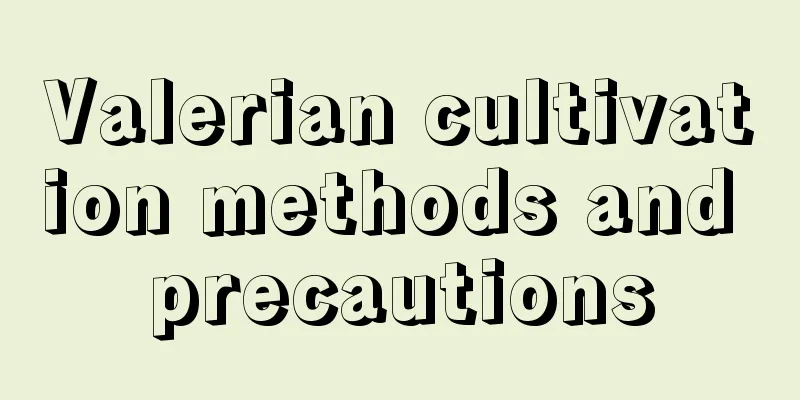Valerian cultivation methods and precautions

1. Maintenance methods1. Soil: The soil for growing valerian should be neutral sandy loam. This kind of soil is fertile and deep, which can meet the needs of growth and can grow better. 2. Water: The soil should be kept moist during the seedling stage. When the plant grows a little bigger and the soil becomes dry, water it appropriately, about once every ten days. When it rains, you can let it enjoy the baptism of rain water, just drain the water in time. 3. Nutrients: Valerian does not require much fertilizer during cultivation, and fertilizing twice a year is enough. Choose compound fertilizer and spread it evenly in the soil. Do not spread it directly on the roots of valerian to avoid burning the roots. 4. Light: Valerian does not like strong light and should be placed in diffuse light. This will allow it to better absorb light and promote vigorous growth. 2. Breeding techniques1. Pruning: During the maintenance period, regular loosening, weeding and pruning are required to better enable the valerian to grow. If there are yellow and wilted branches and leaves, they should be pruned off appropriately so that they can better absorb nutrients and grow healthily. 2. Reproduction: The main method of reproduction is seed propagation. After the seeds are mature, they are scattered in the soil. Spray water to keep it moisturized, and then it will sprout in about half a month. 3. Problem diagnosis and treatment1. Mosaic disease: Mosaic disease is common during the growth period of valerian, and this disease will directly affect the growth of the plant. The solution is to prune off the diseased branches and leaves and then spray them with antiviral regulators. 2. Mole cricket: Mole cricket is a common pest of valerian. It is very harmful to valerian. If it is not killed in time, it will affect its growth. It can be solved by spraying it with diluted dichlorodiphenyltrichloroethane. IV. Other issues1. How to spend the winter: In winter, it should be moved indoors for maintenance, and the room temperature should be controlled at around 20 to 24 degrees Celsius, and then placed in a place with sufficient light and good ventilation, so as to ensure its safety during the winter. 2. Whether it can be exposed to rain: Valerian can be exposed to rain. The humid air in rainy weather can provide moisture to its branches and leaves, and can also wash away the dust on its branches and leaves, making it look brand new and extraordinarily beautiful. |
<<: Breeding methods and precautions for small blue clothes
>>: The cultivation method and precautions of Xiebai
Recommend
When is the right time to plant potatoes?
Potatoes , also known as potatoes, have different...
How to propagate figs by cuttings
The fig tree is a very common fruit tree in farme...
Disease prevention and control of desert rose
Desert Rose Leaf Spot The most common disease of ...
Is it auspicious to keep azalea at home? Is it unlucky to put azalea at home?
1. Is it auspicious to keep it at home? We all kn...
Planting methods and conditions of Adenophora australis
Adenophora australis is a commonly used Chinese m...
The best planting time and technical management of white radish. Detailed planting steps
White radish planting time The best time to plant...
Passion fruit cutting time
1. Cutting time Passion fruit cuttings can be car...
What is the reason why Clivia leaves turn yellow?
Clivia is widely loved for its elegant shape and ...
Which month is the best to sow water spinach?
Water spinach is popular for its crisp taste. As ...
What are the fruits in Taiwan?
1. Buddha's apple This is a relatively famous...
How often should you water your poinsettia?
1. Watering principles Before watering it, always...
Is false forsythia poisonous? Can it be grown indoors?
Is Forsythia pseudoaerophila poisonous? The flowe...
How to grow asparagus fern in winter
Keep warm Asparagus fern is native to southern Af...
How to plant lucky clover
1. Soil treatment This lucky grass is actually al...
How to fertilize lucky bamboo? What fertilizer is best?
1. Fertilization time When fertilizing lucky bamb...









